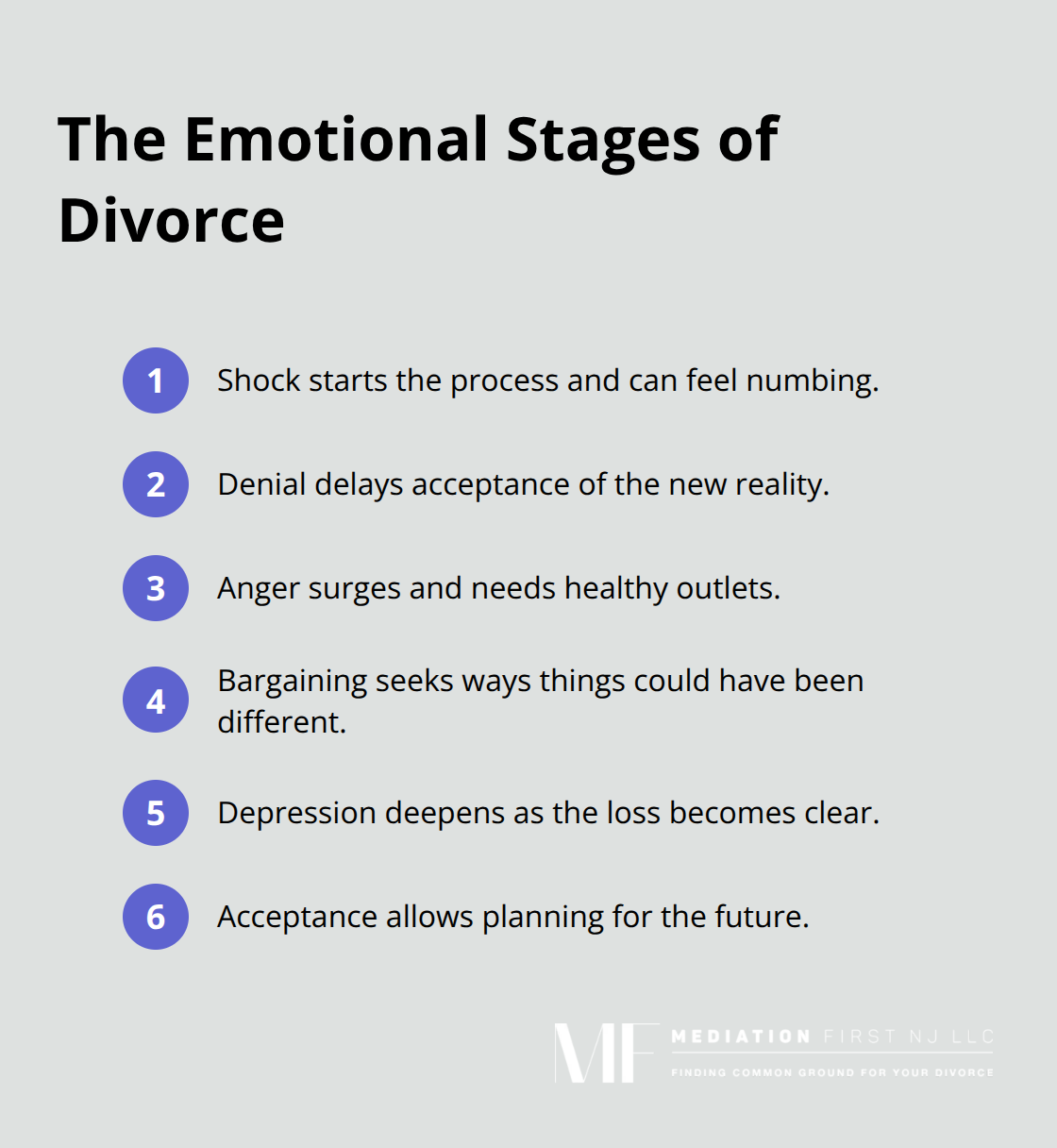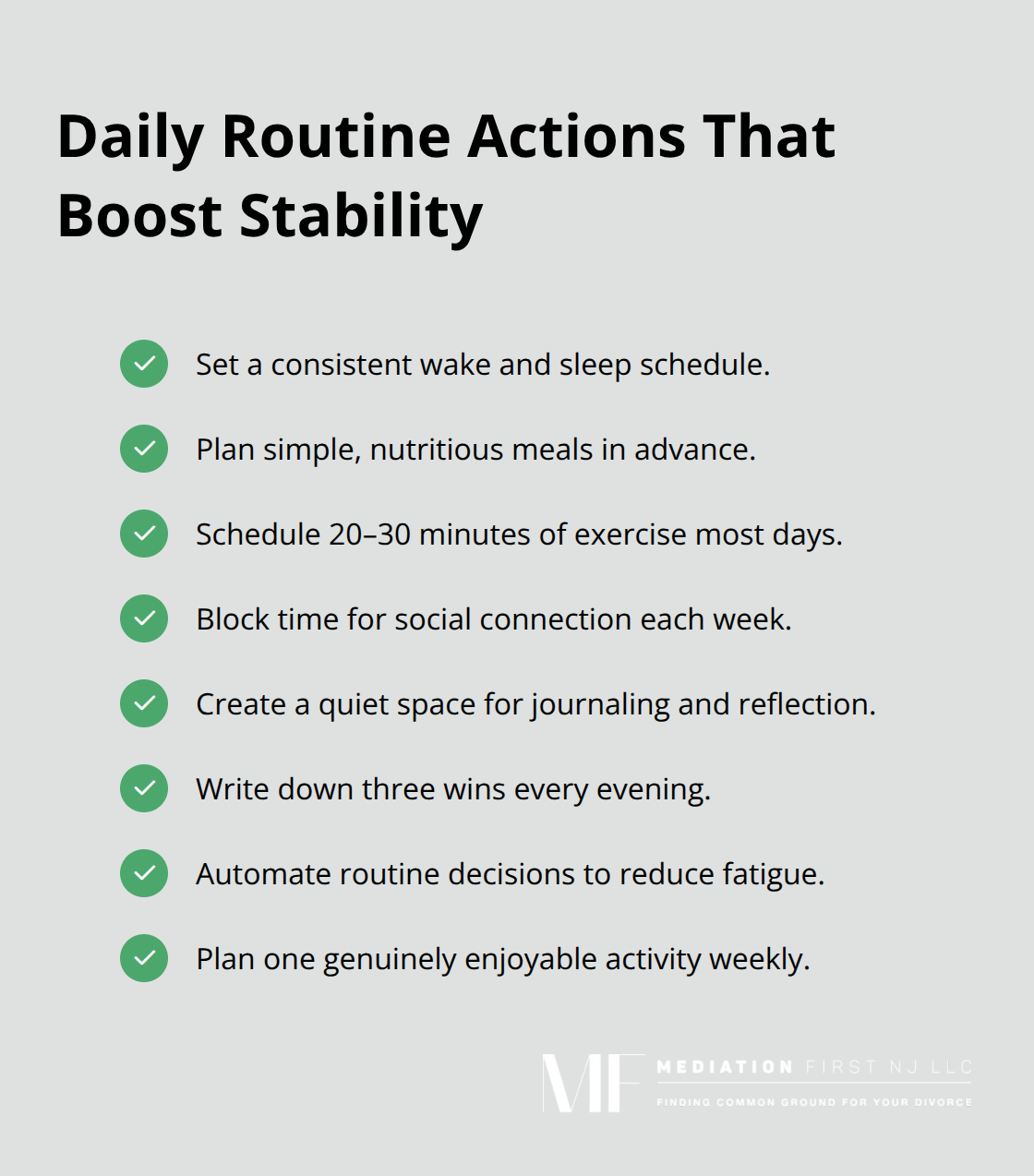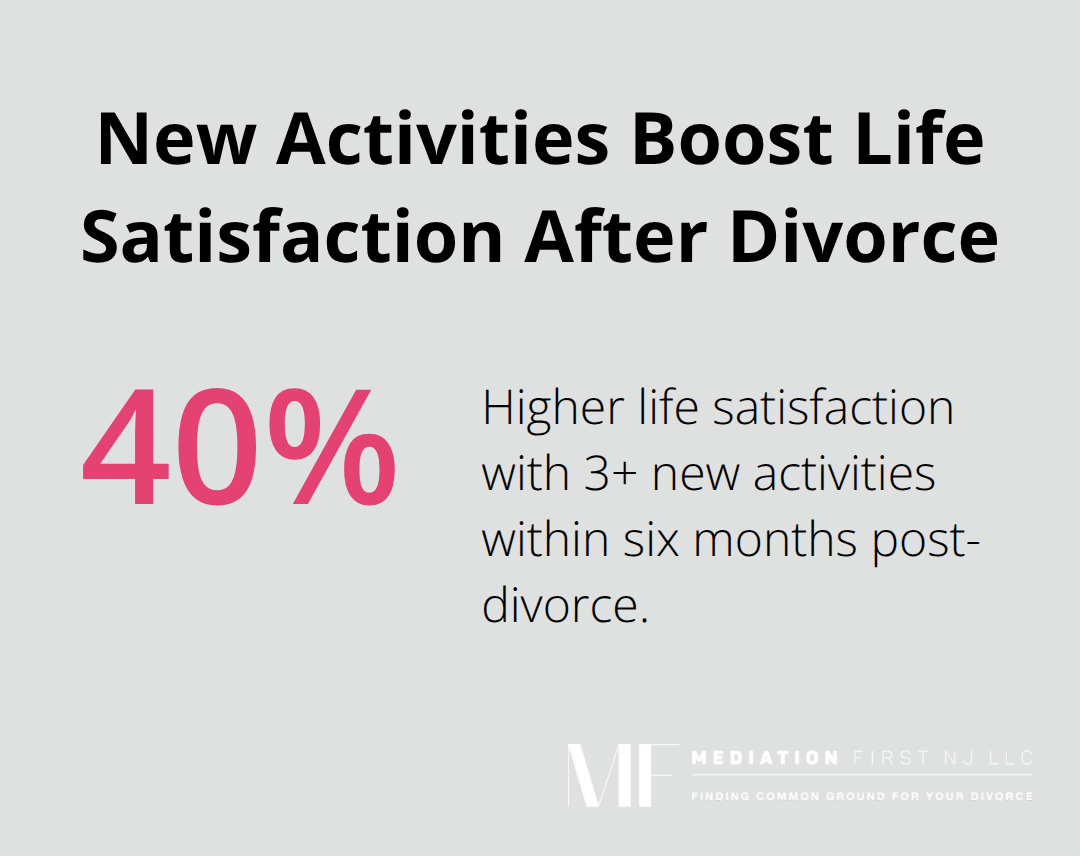Divorce affects 40-50% of marriages in the United States, leaving millions of people struggling with complex emotions and life changes. The emotional recovery after divorce process can feel overwhelming without proper guidance.
We at Mediation First NJ LLC understand that healing takes time and the right strategies. This guide provides research-backed methods to help you rebuild your emotional well-being and create a fulfilling new chapter in your life.
What Emotional Stages Should You Expect During Divorce
The American Psychological Association identifies divorce as one of life’s most stressful events, comparable to death. Your emotional response follows predictable stages that mirror the grief process Elisabeth Kübler-Ross outlined: shock, denial, anger, bargaining, and depression before you reach acceptance.
Initial Shock and Denial Phase
The shock phase typically lasts several weeks and provides temporary emotional protection while your mind processes the reality. Your brain creates this buffer to prevent emotional overload during the most vulnerable period. Many people report feeling numb or disconnected from their emotions during this stage, which serves as a natural defense mechanism.

Pain and Guilt Emerge
Pain and guilt surface next, often accompanied by physical symptoms like sleep disruption and appetite changes. This stage forces you to confront the reality of your situation without the protective numbness. Your body responds to emotional stress with tangible symptoms that require attention and care.
Anger and Bargaining Period
Most people experience intense anger around months 2-4, which serves as emotional fuel but requires healthy outlets to prevent destructive behaviors. This anger often alternates with bargaining thoughts about what could have been different. The combination creates emotional volatility that challenges your daily stability.
Recovery Timeline Expectations
Research shows most people suffer mental health symptoms during and after a divorce for a year or two, with a general guideline of one year for every five years of marriage. The depression stage often peaks between months 6-9, when the full impact of your loss becomes clear. Typically, it takes that long to adjust to your new life after divorce. The acceptance stage doesn’t guarantee immediate happiness but marks when you begin planning your future rather than mourning your past.
Professional Support Benefits
Cognitive behavioral consultation was effective in improving marital quality and can be used in health care centers. Professional therapists help reshape negative thought patterns and provide coping strategies specific to your situation. Support groups show similar effectiveness, with participants reporting less isolation compared to those who heal alone.
These emotional stages create the foundation for your recovery journey, but active strategies can help you navigate them more effectively.
What Actions Speed Up Emotional Recovery
Social science research proves that positive interactions with weak ties enhance emotional well-being and foster community connection during divorce recovery. Your support network requires intentional cultivation rather than passive hope. Contact three friends weekly through text or phone calls, even when motivation feels absent. Join divorce support groups in your area or online communities where others share similar experiences. The Gottman Institute research shows that individuals with active support systems recover faster than those who isolate themselves.
Create Structure Through Daily Routines
Establish non-negotiable morning and evening routines within your first month post-separation. Wake at the same time daily, prepare nutritious meals, and schedule specific times for work, exercise, and social activities. Studies indicate that people who maintain consistent sleep schedules during divorce show significantly lower depression rates after six months. Create a designated space in your home for self-reflection and journal work. Write down three accomplishments each evening, regardless of size.

Replace decision fatigue with automatic habits that support your physical and mental health. Schedule weekly activities you genuinely enjoy rather than obligations that drain energy.
Manage Stress Through Physical Activity
Exercise reduces levels of the body’s stress hormones, such as adrenaline and cortisol, making it more effective than many medications for stress management. Try 150 minutes of moderate activity weekly, broken into manageable 20-30 minute sessions. Walk, swim, or practice yoga for immediate mood benefits without expensive gym memberships or equipment. Regular exercise, a healthy diet, and adequate sleep can help you manage stress and maintain emotional balance during this challenging time. Practice breath techniques that maintain 10-12 breaths per minute to activate your parasympathetic nervous system during anxiety spikes. Mindfulness meditation for just 10 minutes daily shows measurable brain changes in emotional regulation areas within eight weeks of consistent practice.
Build Financial Security and Independence
Financial anxiety often compounds emotional stress after divorce, particularly for women who may feel financially insecure. Create a detailed budget that accounts for your new single-income reality and identify areas where you can reduce expenses. Meet with a financial advisor to develop a solid plan for your post-divorce financial future (this step becomes essential when you feel embarrassed about your financial situation). Learn basic financial literacy skills if you previously relied on your spouse for money management. Open individual bank accounts and establish credit in your name alone to build financial independence.
These practical strategies create the foundation for emotional stability, but true recovery requires you to rediscover who you are as an individual outside of marriage.
How Do You Rebuild Your Identity After Divorce
Divorce strips away the shared identity you built during marriage and forces you to rediscover who you are as an individual. Start with a list of activities you enjoyed before marriage or interests your spouse dismissed. Research from the University of Utah shows that people who engage in at least three new activities within six months post-divorce report 40% higher life satisfaction scores than those who remain passive.

Explore New Activities and Interests
Sign up for classes, join hobby groups, or volunteer for causes that matter to you. Take that art class, learn a musical instrument, or join a book club you always considered but never pursued. Physical hobbies like rock climbing or tennis provide immediate accomplishment while mental pursuits like creative writing or foreign languages stimulate cognitive growth. Try activities that challenge different aspects of your personality and skills.
Set Specific Financial Targets Within 90 Days
Women face significant financial challenges after divorce, which makes financial planning non-negotiable rather than optional. Calculate your exact monthly expenses and create a realistic budget that reflects your new single-person household. Open a high-yield savings account and commit to save 15% of your income, even if you start with just $50 monthly.
Update your resume and LinkedIn profile within 30 days, then apply for positions that offer advancement opportunities or higher salaries. Consider returning to school for certifications that boost your potential income in your field. Meet with a financial advisor who specializes in divorce recovery to create a five-year wealth-building plan (this should account for retirement, emergency funds, and potential home ownership).
Establish Communication Rules That Protect Your Mental Health
Create a business-like relationship with your former spouse through the BIFF method: keep all interactions Brief, Informative, Friendly, and Firm. Limit communication to essential topics like children, finances, or legal matters through email or co-parenting apps rather than phone calls or text messages. Set specific times for checking messages from your ex-spouse instead of responding immediately to every contact.
Institute a 24-hour rule before you respond to any emotionally charged communication, which prevents reactive responses that escalate conflict. Block your ex-spouse on social media platforms and ask mutual friends not to share updates about their life with you during the first year of separation (this boundary protects your emotional recovery process).
Rebuilding your identity after divorce requires patience and intentional effort, but these concrete steps create the foundation for a stronger, more authentic version of yourself.
Final Thoughts
Emotional recovery after divorce demands consistent action across multiple areas of your life. You must build your support network, maintain daily routines, and set clear boundaries with your former spouse. These steps create stability while you rebuild your identity and plan your future.
Professional counselors become necessary when depression persists beyond nine months, when you experience thoughts of self-harm, or when daily tasks remain severely impaired. Therapists who specialize in divorce recovery provide targeted strategies that accelerate healing compared to managing emotions alone. Most people begin to feel hopeful again within 12-18 months when they follow structured recovery approaches (the timeline varies for everyone based on individual circumstances).
Your new life offers opportunities for authentic relationships and personal growth that weren’t possible during an unhappy marriage. We at Mediation First NJ LLC help families navigate divorce through collaborative mediation rather than adversarial litigation. Recovery starts with informed decisions that serve your family’s future, not dwelling on past conflicts.

